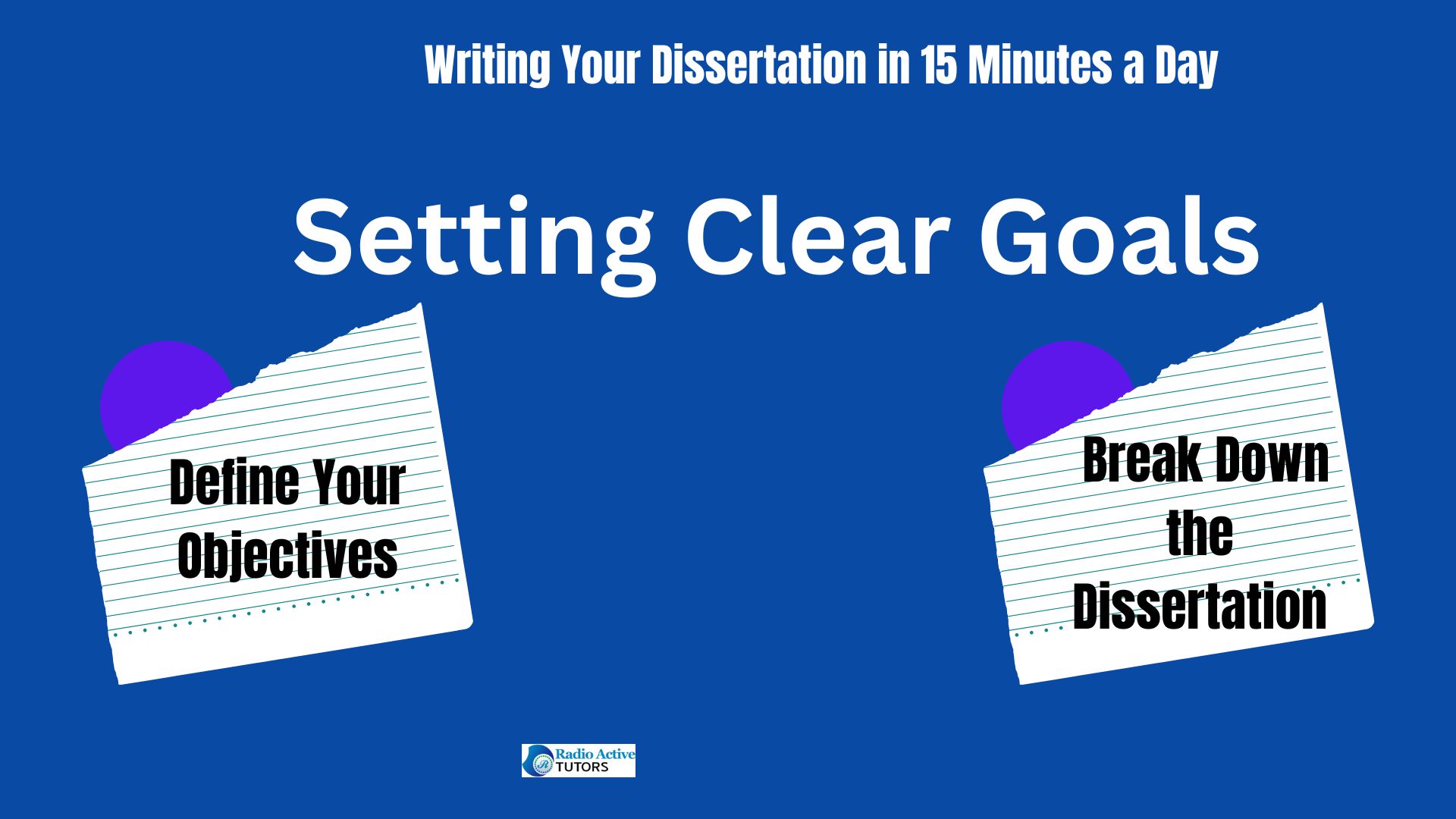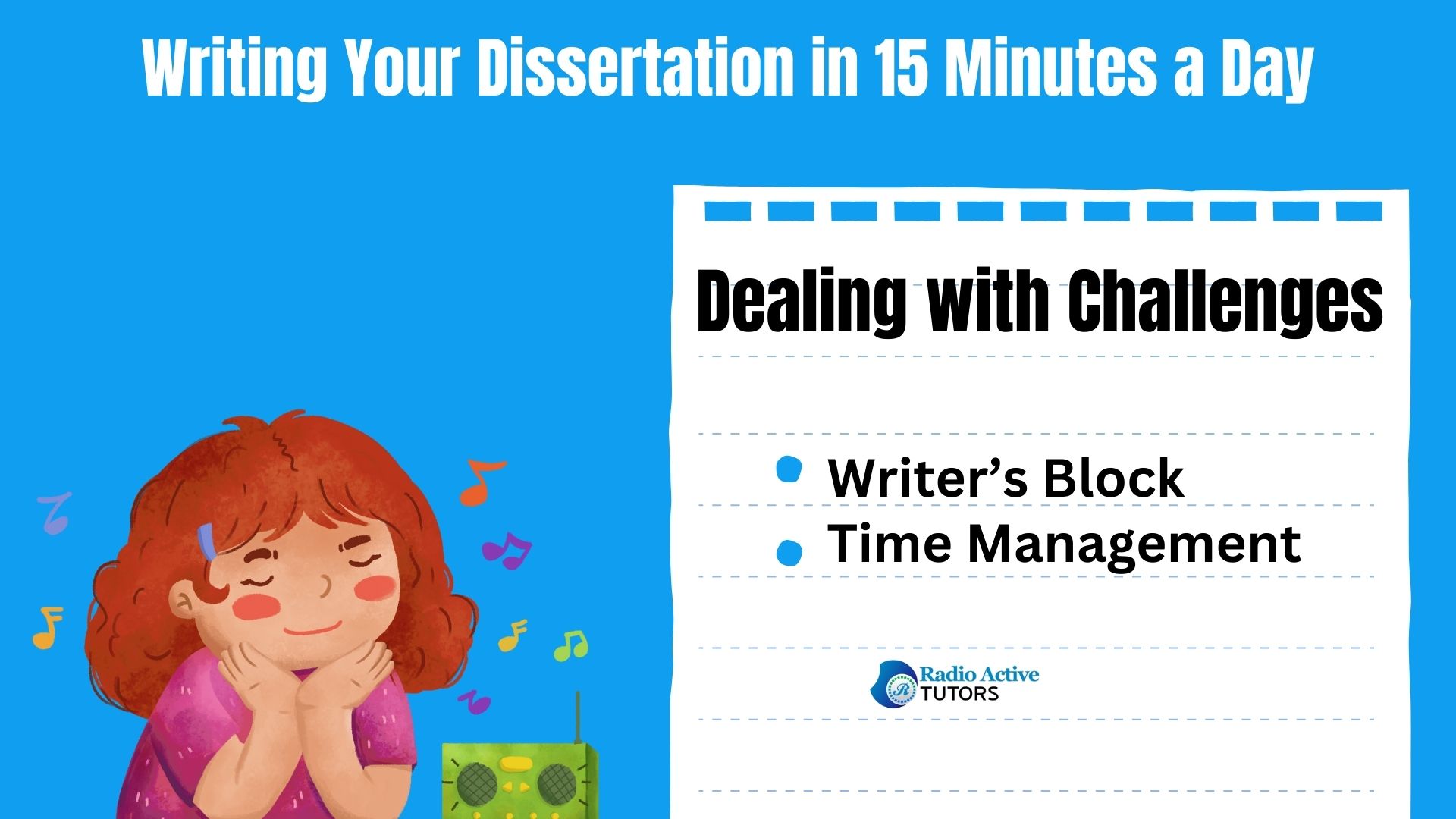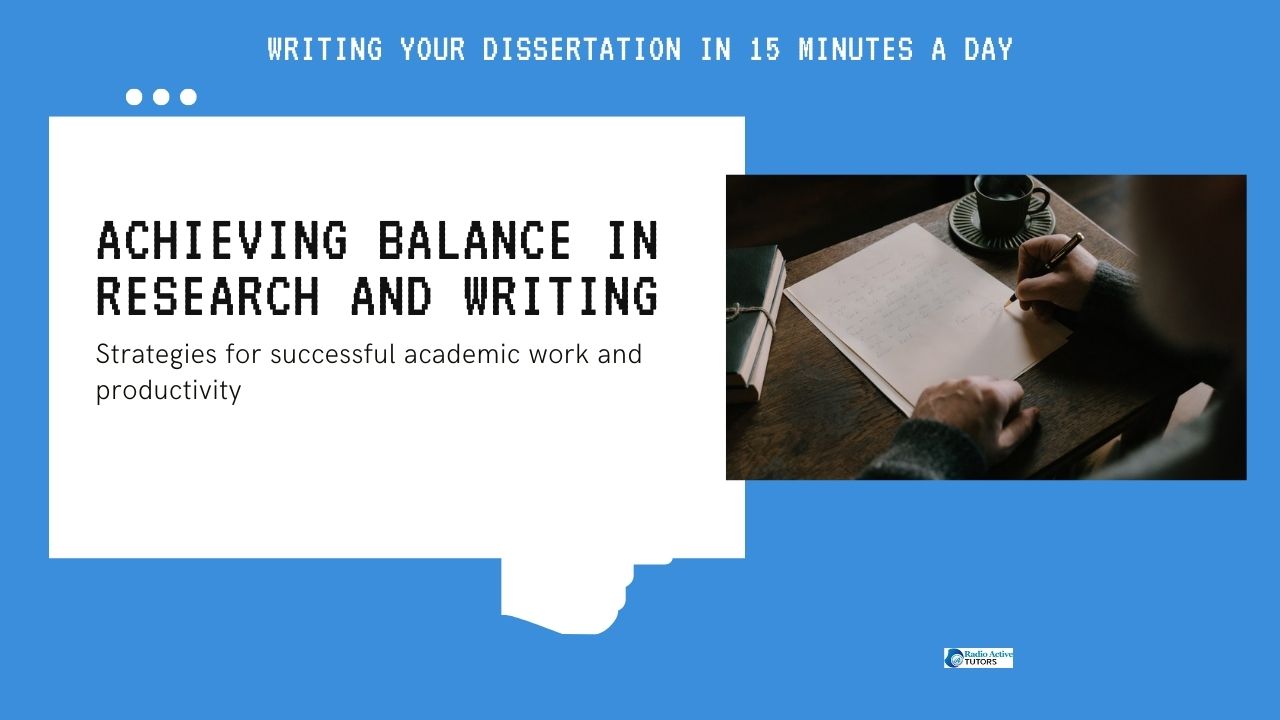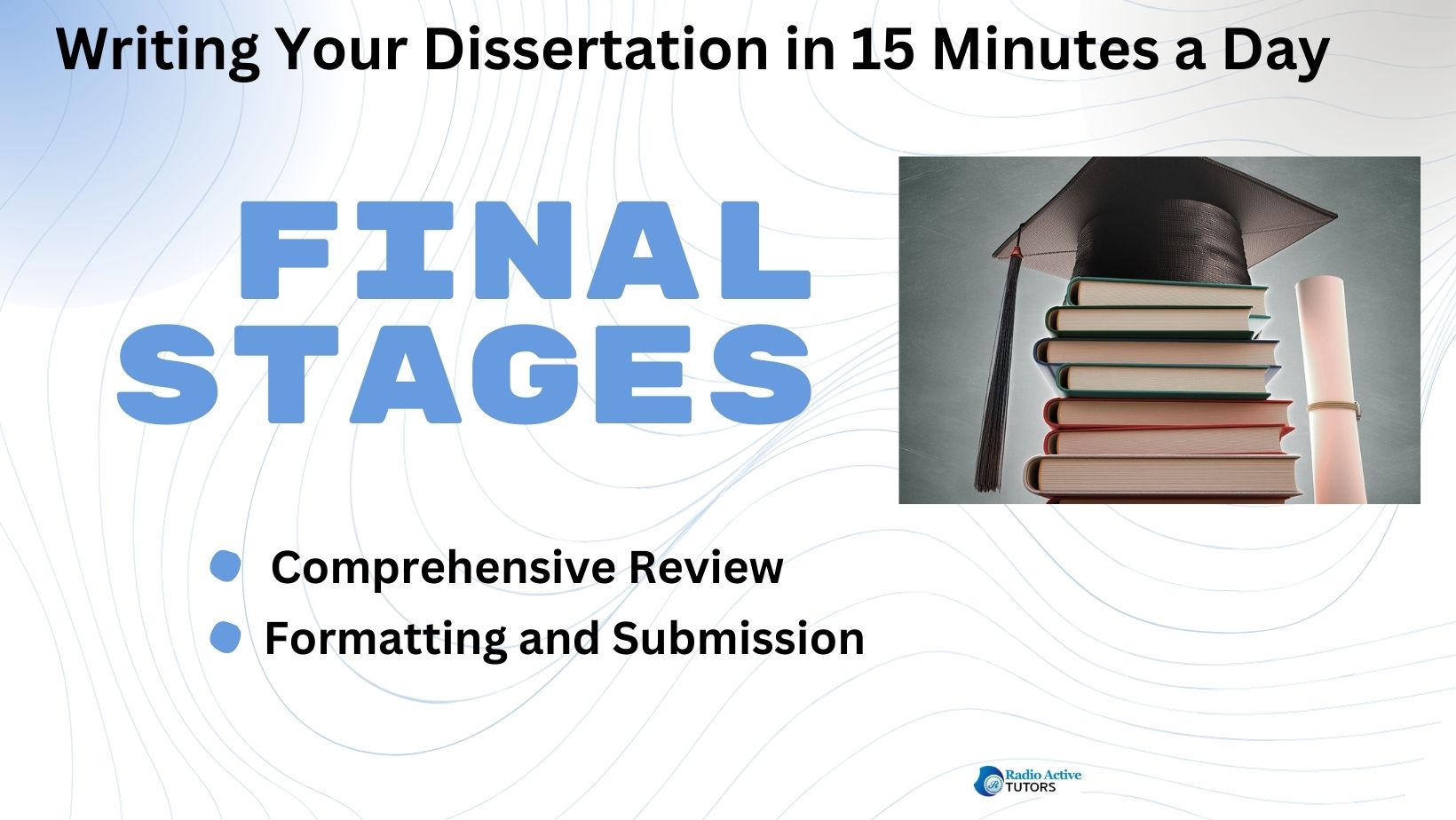1. Understanding the 15-Minute Approach
2. Setting Clear Goals
3. Creating a Structured Plan
4. Preparing for Writing Sessions
5. Writing Techniques
6. Editing and Revising
7. Staying Motivated
8. Dealing with Challenges
9. Utilizing Tools and Resources
10. Seeking Support
11. Balancing Research and Writing
12. Maintaining Health and Well-being
13. Final Stages
14. Reflecting on Your Journey
Writing a dissertation is a significant academic challenge that requires careful planning, dedication, and effective time management. The idea of making progress in just 15 minutes a day might seem improbable, but with the right strategies, it’s possible to achieve substantial progress consistently.
This guide will outline how you can utilize 15 minutes of focused work each day to advance your dissertation.
1. Understanding the 15-Minute Approach
The concept behind the 15-minute method is rooted in the power of consistent, focused effort. By dedicating a short, manageable amount of time every day, you can build momentum and avoid burnout. This approach breaks down the overwhelming task of writing a dissertation into manageable chunks.
2. Setting Clear Goals

a. Define Your Objectives
Before you start, identify specific goals for each session. For example:
b. Break Down the Dissertation
Divide your dissertation into sections and sub-sections. This will make it easier to identify what can be accomplished in 15 minutes. For instance:
- Introduction
- Literature Review
- Methodology
- Results
- Discussion
- Conclusion
3. Creating a Structured Plan
a. Develop a Schedule
Create a daily or weekly schedule that includes 15-minute writing sessions. Consistency is key, so choose a time of day when you’re most likely to be focused and undisturbed.
b. Use a Timer
Set a timer for 15 minutes. This will help you stay on track and ensure that you’re working efficiently.
4. Preparing for Writing Sessions
a. Gather Your Materials
Ensure you have all the necessary materials before starting. This might include:
- Research articles
- Data sets
- Notes
- Outlines
b. Minimize Distractions
Find a quiet space and minimize distractions. Turn off notifications on your devices and let others know you’re not to be disturbed.
5. Writing Techniques

a. Free Writing
Start with free writing to get your ideas flowing. Don’t worry about grammar or structure initially; focus on getting your thoughts down on paper. This method involves writing continuously for a set period without worrying about grammar, punctuation, or the exact wording. The goal is to get your ideas flowing and capture your thoughts in their raw form.
Free writing helps bypass writer’s block by allowing you to express your thoughts freely and organically. It can be particularly useful at the beginning of a writing session to warm up your mind or when tackling a challenging section of your dissertation.
By dedicating just 15 minutes to free writing, you can generate a wealth of material that can later be refined and structured into coherent arguments and sections. This technique not only boosts creativity but also helps you discover new insights and connections within your research, making the overall writing process more dynamic and productive.
b. Incremental Writing
Build on what you’ve written in previous sessions. This could involve expanding on a paragraph, adding citations, or refining your argument.Incremental writing is a highly effective technique in the guide to writing your dissertation in 15 minutes a day. This approach involves breaking down the writing process into small, manageable tasks that can be completed in short, focused sessions.
By incrementally building your dissertation, you avoid the overwhelm of trying to tackle large sections all at once. Each 15-minute session can be devoted to a specific task, such as writing a paragraph, refining an argument, or reviewing a particular section. This method promotes steady progress and allows for continuous improvement, as each small effort contributes to the overall structure and quality of your dissertation.
6. Editing and Revising
a. Focused Editing
Use some of your 15-minute sessions for editing and revising. Focus on one aspect at a time, such as clarity, coherence, or grammar.
b. Peer Review
Periodically, use a session to review feedback from peers or advisors and make necessary adjustments.
7. Staying Motivated
a. Celebrate Small Wins
Recognize and celebrate the completion of small tasks. This can help maintain motivation and momentum.
b. Track Your Progress
Keep a log of what you accomplish in each session. Seeing your progress over time can be encouraging.
8. Dealing with Challenges

a. Writer’s Block
If you encounter writer’s block, use the 15 minutes to brainstorm ideas, read relevant literature, or outline future sections.
b. Time Management
If finding 15 minutes daily is difficult, try to identify and eliminate time-wasting activities from your schedule.
9. Utilizing Tools and Resources
a. Writing Software
Consider using writing software like Scrivener or Grammarly to streamline your process.
b. Research Databases
Regularly use research databases to find and organize relevant literature.
10. Seeking Support
a. Academic Advisors
Regularly consult with your academic advisor for guidance and feedback.
b. Writing Groups
Join writing groups or find a writing partner to share progress and receive encouragement.
11. Balancing Research and Writing

a. Integrating Research
Incorporate research tasks into your 15-minute sessions, such as reading articles or summarizing findings.Integrating research effectively while balancing the writing process is crucial in the guide to writing your dissertation in 15 minutes a day. This approach requires a strategic allocation of time where research activities and writing sessions complement each other.
Begin by dedicating specific 15-minute intervals exclusively for gathering and reviewing relevant literature, ensuring you build a robust foundation of sources. By interspersing these research-focused sessions with writing periods, you can continually incorporate fresh insights and evidence into your dissertation.
This balanced methodology not only maintains the momentum of your writing but also enriches the content with up-to-date, well-integrated research, ultimately leading to a more comprehensive and coherent dissertation.
b. Continuous Learning
Continuous learning plays a pivotal role in balancing research and writing when following the guide to writing your dissertation in 15 minutes a day. This approach encourages an ongoing acquisition of knowledge that fuels both the research and writing processes.
By dedicating time to stay updated with the latest developments in your field, you ensure that your dissertation remains current and relevant. Engaging in continuous learning allows you to refine your research questions, enhance your arguments, and introduce innovative perspectives into your work.
This iterative process of learning and applying new information keeps your writing dynamic and informed, fostering a deeper understanding of your subject matter and improving the overall quality of your dissertation.
12. Maintaining Health and Well-being
a. Regular Breaks
Take regular breaks to avoid burnout. Short, frequent breaks can enhance productivity and creativity.
b. Physical Activity
Incorporate physical activity into your routine to maintain physical and mental health.
13. Final Stages

a. Comprehensive Review
As you near completion, allocate longer sessions for a comprehensive review of your dissertation. After weeks or months of consistent, focused writing sessions, the final stages require a meticulous and holistic examination of your work. This involves reviewing each section for coherence, consistency, and clarity, ensuring that your arguments flow logically and that all research findings are accurately integrated.
Pay close attention to formatting, citations, and adherence to your institution’s guidelines. Breaking down this comprehensive review into manageable 15-minute segments can make this seemingly daunting task more approachable and less overwhelming.
By systematically addressing each aspect of your dissertation, you can refine and polish your work, ensuring that it meets the highest academic standards before submission.
b. Formatting and Submission
Ensure you follow your institution’s formatting guidelines and prepare for the final submission. Formatting and submission in the final stages are crucial aspects of the guide to writing your dissertation in 15 minutes a day. After completing your writing and comprehensive review, dedicate focused 15-minute sessions to meticulously format your dissertation according to your institution’s guidelines.
This includes ensuring consistency in fonts, margins, headings, and citation styles, as well as double-checking figures, tables, and appendices for accuracy. Attention to these details enhances the professional appearance of your dissertation and demonstrates your commitment to academic standards.Read more on the various formatting styles for your dissertation literature review from this source.
Once formatting is complete, allocate time to carefully follow the submission procedures, which may involve converting your document to a specific format, completing required forms, and meeting specific deadlines. By breaking down these final tasks into manageable intervals, you can efficiently navigate the formatting and submission process, ensuring your dissertation is polished and ready for evaluation.
14. Reflecting on Your Journey
a. Self-Assessment
Reflect on your progress and the strategies that worked best for you.
b. Future Applications
Consider how the skills and habits you developed can be applied to future academic or professional projects.
